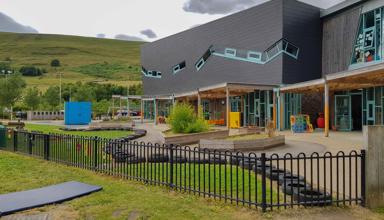Pupils generally don’t tell their teachers when they experience sexual harassment. This is a core finding of a recent report by Estyn, produced after the Welsh Government asked the inspectorate to investigate sexual harassment in and around secondary schools.
Estyn says that secondary schools don’t realise the extent of the problem, although pupils told the inspectorate that sexual harassment occurs so regularly it has become “normalised”.
Estyn will be discussing the subject with the Senedd’s Children, Young People and Education (CYPE) Committee tomorrow (Thursday 10 February) as it begins taking evidence for a new inquiry.
The background
Sexual harassment between young people has received more coverage in the past year, with the Everyone’s Invited website providing a platform for victims to record their testimony and experiences anonymously. Victims can name the school, college or university where the harassment or abuse happened or originated.
The BBC reported in June 2021 that over 90 schools in Wales were listed on the website. It also reported in November 2021 that children as young as 11 are learning about sex from pornography. There are therefore concerns about the exposure of children and young people to sexualised content, including online, and whether this is a cause or at least an exacerbating factor in peer-on-peer sexual harassment.
What did Estyn find?
Estyn visited 35 secondary schools in autumn 2021 and heard from 1,300 pupils. Its main findings were that:
- half of all secondary school pupils say they have personal experience of peer-on-peer sexual harassment and three quarters of all pupils report seeing other pupils experiencing this;
- a majority of female pupils (61%) report having personal experience of peer-on-peer harassment and many (82%) report seeing others experience it. This compares with a lower proportion of male pupils (29% and 71% respectively);
- LGBTQ+ pupils have substantial personal experiences of verbal homophobic harassment, with many saying homophobic bullying is happening all the time; and
- generally, pupils do not tell teachers when they experience sexual harassment. This is because it happens so regularly and they feel it has become normalised.
Estyn found that, where school leaders are aware of incidents of sexual harassment, they respond suitably to formal complaints and make appropriate referrals, for example to social services and the police. However, it also found inconsistency in school staff’s understanding of what sexual harassment is, meaning there are discrepancies in how they respond.
In addition to sexual harassment having become normalised, Estyn has identified several other reasons why pupils don’t report it to teachers:
- they do not feel confident enough;
- the school has not created a culture and environment for them to do so; and
- pupils do not see it as something they should share with their teachers.
Some sexual harassment takes place face-to-face during school hours, most commonly in the form of catcalling and hurtful comments, homophobic comments and comments about appearance. However, more harassment occurs online and outside school hours. Where incidents occur online in the evenings and during weekends, they can affect pupils’ well-being and behaviour during the school day. Teachers told Estyn that parents need to work with them more closely to deal with such incidents and take responsibility for their children’s activity outside school, for example online.
Estyn has already told the CYPE Committee in December 2021 that the number one priority should be
“a recognition that peer-on-peer sexual harassment is highly prevalent in the lives of young people and that schools really need to adopt that whole-school preventative and proactive approach to dealing with it”.
The inspectorate also said this should involve parents and external agencies, since sexual harassment isn’t just for schools to deal with, but involves wider social issues such as safety and responsibility online.
Welsh Government policy and guidance
The Minister for Education and Welsh Language and Minister for Social Justice issued a joint statement on the day Estyn’s report was published, saying it “makes difficult reading” and “highlights the uncomfortable truth about the prevalence of peer-on-peer sexual harassment in our schools”.
The Welsh Government is reviewing its suite of anti-bullying guidance for schools, local authorities, parents/carers, and children and young people. There is also other relevant guidance on safeguarding children in educational settings and the specific topics of peer-on-peer sexual abuse and the sharing of nude pictures.
Guidance on excluding pupils sets out schools’ responsibilities to address pupils’ behaviour off the school site, both during school business and non-school business where it affects discipline within the school.
The new Curriculum for Wales
One of the main ways the Welsh Government aims to address the issue of sexual harassment is through the new curriculum.
Relationships and Sexuality Education (RSE) will be a mandatory element of the age 3-16 Curriculum for Wales and will be taught in both primary and secondary schools in a way that is “developmentally appropriate”. It replaces the current requirement for sex education in secondary schools.
Under RSE, learners will learn about more than sex in a biological sense, but a broader concept of sexuality and what constitutes a healthy (and an unhealthy) relationship.
Teaching of RSE will be guided by a statutory code, approved by the Senedd in December. The Relationships and Sexuality Education Code provides that pupils will learn about the following from age 7:
An awareness of different kinds of harmful or abusive behaviour including physical, sexual, and emotional abuse and neglect, including peer-on-peer harassment and bullying and the role technology can play.
From age 11, pupils will be taught how to recognise harmful, abusive or coercive behaviour and how to respond and seek help.
Estyn’s recommendations
Estyn made nine recommendations in its report. Several of these address shortcomings in the way data is collected and used, with schools not systematically logging incidents as sexual harassment and applying too broad a classification of “bullying”. It says this hinders schools from having an accurate picture of sexual harassment (including of a homophobic nature), as distinct from bullying more generally.
Of the nine recommendations:
- four are for schools, on recognising the problem, providing learning opportunities for pupils, collecting data, and professional learning for staff;
- three are for local authorities, on collecting and using data, intervening and providing support on gender issues, and providing professional learning for school staff; and
- two are for the Welsh Government, on working with local authorities on data and providing best practice guidance and resources for schools.
What next?
The CYPE Committee’s evidence session with Estyn is tomorrow (Thursday 10 February). You can watch it on Senedd TV, either live or at a later date, and a transcript will be available a few days after the session.
Over the next couple of months, the CYPE Committee will continue its Peer-on-peer sexual harassment among learners inquiry, taking evidence from a range of stakeholders and engaging with children and young people, before questioning the Minister for Education and Welsh Language.
Article by Michael Dauncey, Senedd Research, Welsh Parliament






